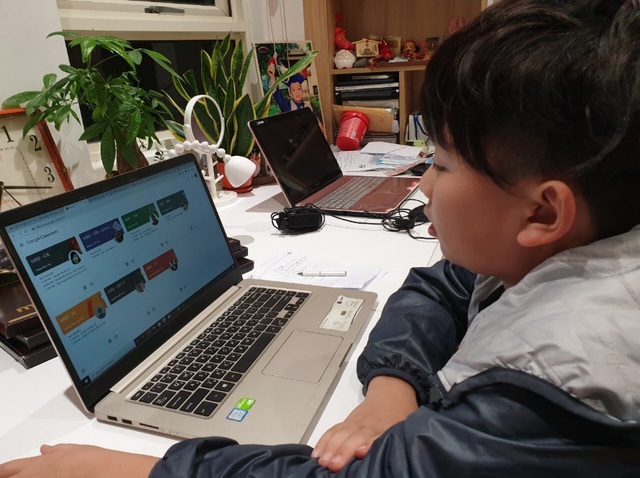 Society
Society

Online teaching will be recognised as a formal method, in parallel with teaching in schools, said Phùng Xuân Nhạ, Minister of Education and Training.

|
| Online teaching will be recognised as a formal method, in parallel with teaching in schools. Photo dantri.com.vn |
HÀ NỘI — Online teaching will be recognised as a formal method, in parallel with teaching in schools, following months of experimenting with the method as a result of COVID-19 pandemic, the education minister said.
Phùng Xuân Nhạ, Minister of Education and Training, was speaking at a recent conference organised by the Ministry of Education and Training with local education departments and universities last week, reviewing and evaluating school-hosted online learning, and teaching programmes via television.
With the slogan "Pausing school without stopping learning", local education departments reported that localities had implemented online learning and teaching via television during the months-long school closure period triggered by the coronavirus crisis.
Minister Phùng Xuân Nhạ said that after this conference, the ministry would soon finalise the draft of online teaching regulations at schools and education institutions.
When there is a legal basis, online teaching will be considered a form of formal teaching. The combination of online teaching and direct learning must continue to be implemented, according to Nhạ.
Distance learning has been implemented for a long time, but this was the first time that the education sector has implemented the programme methodically, widely and with many positive signs.
In the process of implementing the new model (online teaching) the education sector has received attention from the Vietnam Study Encouragement Association, Association of Vietnam Universities and Colleges.
It proved that the education sector has potential and strengths to pioneer the application of technology, according to the minister.
He also affirmed that online teaching was not only a temporary solution during the pandemic but also an important method to improve the quality of education from preschool to university level.
Thereby, a lot of administrative procedures were reduced, knowledge and experience were shared, and pressure on teachers in school also decreased.
An official survey showed that when schools were closed due to COVID-19, provinces gained an average of over 80 per cent of students accessing online learning. This ratio in cities was more than 90 per cent.
However, the minister admitted online teaching was still facing some difficulties, due to poor internet infrastructure, transmission servers, limited interaction between teachers and students, especially in preschool and primary school; as well as students in remote and poor areas.
Speaking about the general education programme, he said: “The ministry will continue to streamline the programme, through evaluating the recent online teaching process, towards a streamlined and effective programme.”
“Shorten the learning and teaching time but the quality and vacation time is still guaranteed,” he said.
Schools should improve advanced technology skills and pedagogy methods of online teaching for teachers.
Students must also be guided to improve their self-awareness and responsibility, especially knowledge and skills, to prevent adverse impacts when participating in the online environment.
The minister also warned that the management of students during days-off due to the pandemic was still poor, while students faced problems when they returned to school. — VNS